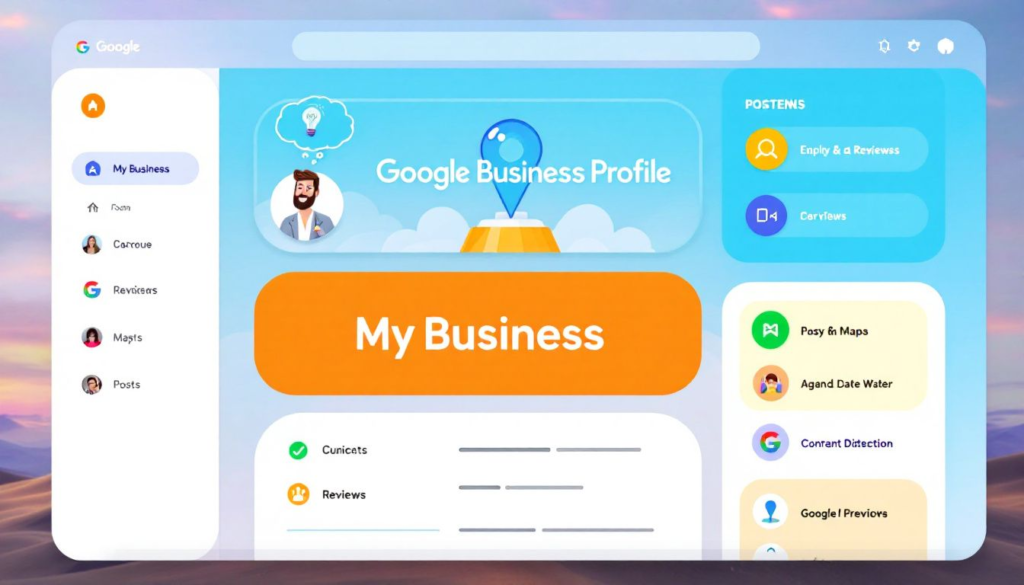Boosting your small business’s online presence doesn’t have to be expensive. This article explores affordable SEO strategies for small businesses. Discover practical and budget-friendly ways to improve your search engine rankings.
Key Takeaways
Optimize your Google Business Profile to enhance local visibility and build customer trust.
Conduct keyword research using free tools to align your content with user search intent, boosting your SEO performance.
Regularly update and refresh your content to maintain relevance, improve engagement, and enhance search engine rankings.
Implement these strategies to drive organic traffic and maximize the benefits of your SEO efforts.
Understanding Search Engine Optimization (SEO)
Search Engine Optimization (SEO) is the art and science of enhancing your website’s visibility in search engine results pages (SERPs). By understanding how search engines like Google operate, you can tailor your website to meet their criteria, thereby improving your search engine rankings. SEO involves a mix of strategies, including keyword optimization, content creation, and technical adjustments, all aimed at making your site more relevant to specific search queries. When done correctly, SEO can drive organic traffic to your site, increasing your chances of converting visitors into customers.
Setting an SEO Strategy
Creating an effective SEO strategy starts with understanding your target audience and their search behavior. Begin by conducting thorough keyword research to identify the terms your potential customers are using. Tools like Google Keyword Planner can be invaluable here. Next, analyze your competitors to see what’s working for them and identify gaps in your own strategy. Set clear, measurable goals for your SEO performance, such as improving search engine rankings or increasing organic traffic. By aligning your content with user intent and continuously monitoring your progress, you can refine your strategy to achieve better results.
Create a Content Calendar
A content calendar is a strategic tool that helps you plan, organize, and schedule your content creation efforts. By mapping out your content in advance, you ensure consistency and relevance, which are crucial for maintaining high search engine rankings. Your content calendar should include topics, relevant keywords, and formats for various types of content, such as blog posts, social media updates, and videos. Assign deadlines and responsibilities to keep your team on track. This organized approach not only streamlines your content production but also ensures that your content is optimized for search engines, driving more organic traffic to your site.
Optimize Your Google Business Profile

One of the most straightforward and effective ways to improve your local SEO is by optimizing your Google Business Profile. Updating your business information enhances local search visibility. Providing accurate and complete information helps potential customers find and choose your business.
A well-maintained Google Business Profile can significantly boost customer trust. Showcasing reviews and ratings offers essential business information that can influence customer decisions. Offering a detailed description of your business ensures search engines understand your business, improving search rankings.
Local SEO heavily relies on relevance, distance, and prominence. Google’s algorithm considers these factors to display the most relevant local businesses to users. Therefore, maintaining accurate information like business hours, address, and contact details is vital.
Optimizing your Google Business Profile is a powerful and affordable SEO strategy to increase visibility in local search and drive more organic traffic.
Conduct Keyword Research with Free Tools
Keyword research is the backbone of any successful SEO strategy. It involves identifying terms potential customers use when searching for products or services like yours. By targeting these keywords, you can create content that aligns with search intent and improves your search engine rankings.
Google Keyword Planner, a free tool, is invaluable for keyword research. These tools provide data like search volume and keyword competition to help prioritize keywords. Understanding the search volume of a keyword tells you how often it is searched, while keyword competition indicates how difficult it will be to rank for that keyword.
Aligning your content with user search intent is crucial for SEO success. When users find content that matches their intent, they are more likely to engage with it, leading to better SEO performance. If your target audience searches for “affordable SEO strategies,” your content should comprehensively address this topic.
Competitor analysis is another effective way to find valuable keywords. By analyzing the keywords that your competitors are targeting, you can identify gaps and opportunities in your own strategy. This approach helps discover new keyword ideas and provides insights into what works in your industry.
Incorporating these relevant keywords naturally into your content can significantly enhance your search engine optimization efforts. Avoid keyword stuffing, as it can negatively impact your rankings. Instead, focus on creating high-quality, relevant content that addresses your audience’s needs.
Create High-Quality, Optimized Content
High-quality, optimized content is essential for improving organic search rankings and is a key component of content marketing. The quality of your content is more important than the quantity. Search engines prioritize valuable content that provides genuine insights and answers to users’ queries.
Focus on creating content that is both valuable and SEO-friendly to attract organic traffic and build a loyal audience. Use targeted keywords naturally throughout your content to enhance keyword optimization and boost user engagement. Secondary keywords can cast a wider net, improving chances of ranking for various search terms.
Linking to relevant sources and additional information enhances your content’s value. This not only helps in building authority but also improves user experience by providing comprehensive information on the topic. Content that answers common search questions increases chances of ranking for featured snippets.
Regular updates are crucial for maintaining relevance and improving performance in search results. Search engines favor fresh content, so review and refresh periodically. This practice can lead to longer dwell times, which indicate valuable content to search engines.
In conclusion, high-quality, optimized content is a cornerstone of any effective SEO strategy. Focusing on creating valuable content and updating it regularly can significantly improve search engine rankings and drive more organic traffic.
Implement On-Page SEO Best Practices
On-page SEO is a critical component of search engine optimization. It involves optimizing web pages to improve search engine rankings and drive organic traffic. A key element of on-page SEO is the use of heading tags. Headings should follow a logical hierarchy, with the H1 tag used only once per page to reflect the main topic, including considerations for technical seo.
Including primary keywords in your heading tags can enhance your page’s search relevance. This helps search engines understand your content’s context and improves its ranking chances. Avoid keyword stuffing in titles and headings, as this can negatively impact your search engine ranking.
Metadata, including meta descriptions and meta tags, plays a significant role in on-page SEO. A well-crafted meta description offers a concise summary of your site’s content, encouraging clicks in search results. Descriptive URLs help users understand your page content, positively impacting click-through rates.
Adding alt text to images is another crucial on-page SEO practice. Alt text helps search engines understand image content, improving chances of ranking in image search results. This practice also enhances accessibility, making your website user-friendly.
In summary, implementing on-page SEO best practices is essential for improving your search engine optimization.
Here are some key practices to consider:
Optimizing heading tags
Enhancing metadata
Structuring URLs effectively
Improving images for better search relevance
These strategies will help drive more organic traffic to your site.
Leverage Local SEO Tactics
Local SEO is vital for small businesses looking to attract local customers. Ensuring NAP (Name, Address, Phone number) consistency across online directories is foundational to local SEO. Accurate NAP information helps search engines understand your location, improving local search visibility.
Building local citations is a good starting point for local SEO. This involves listing your business on local directories with accurate NAP information. Citations help search engines verify your business’s legitimacy and can boost local search rankings.
Including local keywords in meta tags enhances chances of being featured in local search results. For example, if you run a bakery in New York, including phrases like “best bakery in New York” in your meta tags can improve your local search visibility.
Monitoring and responding to customer reviews is crucial for local SEO. Positive reviews enhance your business’s reputation and influence local search rankings. Encouraging satisfied customers to leave reviews and addressing negative feedback promptly builds trust and drives local traffic.
In conclusion, leveraging local SEO tactics can help small businesses improve their visibility in local search results. Here are some key strategies to consider:
Ensuring NAP consistency (Name, Address, Phone number)
Building citations
Using local keywords
Managing customer reviews
These efforts enhance local SEO and attract more customers.
Build a Mobile-Friendly Website
In today’s mobile-first world, having a mobile-friendly website is essential for SEO and user experience. Mobile optimization improves local engagement, with many mobile searches leading to business visits. Search engines prioritize responsive designs, impacting SEO performance significantly.
A mobile-friendly website can lead to higher conversion rates, as users are more likely to take action on sites that are easy to navigate on their mobile devices. Mobile-compatible websites encourage visitors to stay longer and engage more with the content. Increased engagement can improve search engine rankings.
Statistics show that over half of all web traffic comes from mobile devices, making a responsive design crucial to retain visitors. Mobile-friendly websites automatically adjust layout and navigation for smaller screens, enhancing user experience. This adaptability ensures that your content is accessible and easy to read on any device.
In summary, building a mobile-friendly website is a crucial step in your SEO strategy. Ensuring your website is responsive and easy to navigate on mobile devices improves user engagement, increases conversion rates, and boosts search engine rankings.
Utilize Free SEO Tools for Performance Monitoring
Using free SEO tools is a cost-effective way to monitor and improve website performance. Tools like Google Analytics and Google Search Console offer valuable insights into your site’s SEO. Google Search Console provides detailed performance reports, showing metrics like clicks, impressions, and average position in search engine results.
Google Search Console monitors your site’s presence in Google search results and identifies visibility issues affecting traffic. It provides detailed performance reports, highlighting areas needing improvement.
Google Analytics offers traffic analysis revealing the sources of your website traffic. This information is crucial for assessing marketing effectiveness and optimizing site performance. Understanding your traffic sources helps make informed decisions on where to focus SEO efforts.
Linking Google Search Console and Google Analytics provides enhanced insights into website performance and keyword effectiveness. This integration helps track key metrics and make data-driven decisions to improve SEO strategy.
In conclusion, utilizing free SEO tools for performance monitoring is essential for any small business looking to improve its search engine rankings. By leveraging tools like Google Analytics and Google Search Console, you can gain valuable insights into your site’s performance and make informed decisions to optimize your SEO efforts.
Engage in Link Building Through Community Involvement
Link building is a powerful SEO strategy that involves acquiring high-quality backlinks to improve your website’s authority and search engine rankings. One effective way to build links is through guest blogging. By contributing valuable and engaging content to other websites, you can earn backlinks and enhance your backlink profile, increasing your visibility.
Guest blogging helps acquire backlinks and improves website authority and SEO rankings. When done correctly, it can drive organic traffic to your site and enhance your overall SEO performance.
Engaging with online communities is another effective backlink-building strategy. Participating in forums, social media platforms, and online communities helps build relationships with influencers and gain cost-free backlinks. Social media platforms can also boost your visibility and drive organic traffic to your site.
Original research is a powerful link-building tool. Conducting and publishing original research attracts backlinks from reputable websites, solidifying your industry authority. This approach not only enhances your link profile but also drives organic traffic to your site, helping to identify and fix broken links.
In summary, engaging in link building through community involvement is a cost-effective way to improve your SEO. By guest blogging, participating in online communities, and conducting original research, you can build high-quality backlinks and enhance your search engine rankings.
Building Topical Authority
Building topical authority means becoming a go-to resource for information on a specific subject. This involves creating a comprehensive library of high-quality, relevant content that addresses the needs and questions of your target audience. By consistently publishing valuable content, you can establish your website as an authority in your niche, which can significantly improve your search engine rankings. Topical authority not only boosts your credibility but also enhances user trust, making visitors more likely to return to your site and engage with your content.
Technical SEO Essentials
Technical SEO is the backbone of your website’s search engine optimization efforts. It involves optimizing various technical aspects of your site to improve its performance and user experience. Key elements include website speed, mobile responsiveness, and secure connections (HTTPS). Ensuring that your site is easily crawlable and indexable by search engines is also crucial. This means optimizing your site’s structure, using proper header tags, and creating a logical internal linking system. By addressing these technical factors, you can enhance your site’s relevance and authority, leading to better search engine rankings and a more satisfying user experience.
Regularly Update and Refresh Existing Content
Regularly updating and refreshing your existing content is a crucial strategy for maintaining and improving your search engine rankings. Search engines prioritize content that is fresh and relevant, making regular updates essential for staying competitive. Updating content signals to search engines that your site is active and provides current information, enhancing search rankings.
User engagement is significantly impacted by content freshness. Regular updates improve user engagement, encouraging repeat visits and building audience trust. When users find valuable and up-to-date information on your site, they are more likely to return and engage with your content.
Failing to refresh outdated content can reduce visibility in search results, decreasing organic traffic. Integrating new trends and keywords into old content makes it more valuable to readers and improves search performance.
Best practices for updating content include improving readability, optimizing meta tags, and ensuring mobile-friendliness. Creating a content update schedule maintains organization and ensures regular updates. This systematic approach keeps your content relevant and engaging.
In summary, regularly updating and refreshing your content is essential for maintaining high-quality content and improving your search engine rankings. Conducting a content audit helps identify areas that need updating, ensuring your content remains fresh and relevant. Keeping content fresh and relevant enhances user engagement, drives more traffic, and keeps you competitive in search results.
Summary
Throughout this guide, we’ve explored nine affordable SEO tactics that can significantly boost your small business’s online presence. From optimizing your Google Business Profile to leveraging free SEO tools, each strategy plays a vital role in improving your search engine rankings and driving organic traffic.
The key to SEO success lies in consistency and continuous improvement. By regularly updating your content, engaging in link-building through community involvement, and utilizing free tools for performance monitoring, you can maintain a strong online presence and stay ahead of the competition.
Remember, effective SEO doesn’t have to be expensive. With the right strategies and a commitment to ongoing optimization, you can achieve remarkable results and grow your small business. Embrace these tactics, and watch your search engine rankings soar.
Frequently Asked Questions
What is the most important factor for local SEO?
The most important factor for local SEO is maintaining consistent NAP (Name, Address, Phone number) information across all online directories. Get this right, and you’ll significantly boost your local search visibility!
How often should I update my website’s content?
Updating your website’s content every 9-12 months will keep it fresh and relevant, helping you engage your audience effectively. Stay proactive and make those updates a regular part of your routine!
What are some free tools for keyword research?
Google Keyword Planner is a powerful free tool that can help you effectively optimize your SEO strategies. Embrace its capabilities to enhance your keyword research today!
How can I build high-quality backlinks?
To build high-quality backlinks, focus on guest blogging and actively participating in relevant online communities. These strategies not only enhance your visibility but also create valuable connections that can boost your site’s authority!
Why is a mobile-friendly website important for SEO?
A mobile-friendly website is crucial for SEO because it enhances user experience and engagement, directly leading to improved search engine rankings and higher conversion rates. Embrace this change to maximize your online success!



